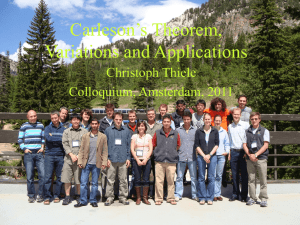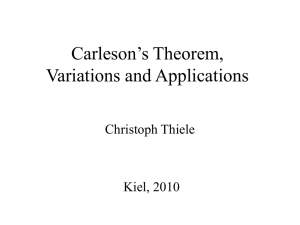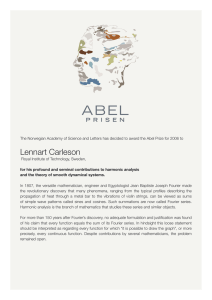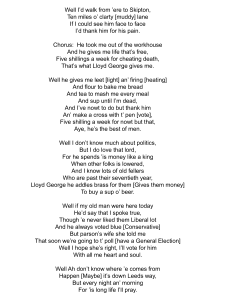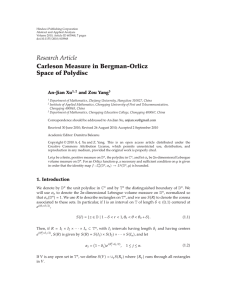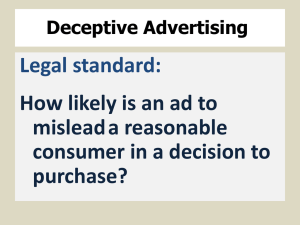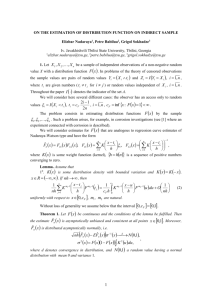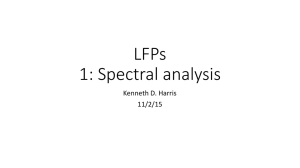Symmetries in Analysis on R
advertisement
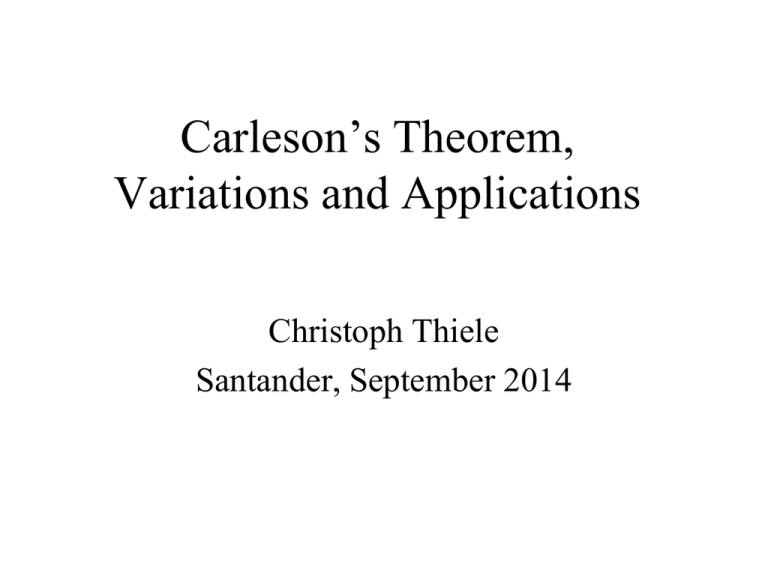
Carleson’s Theorem, Variations and Applications Christoph Thiele Santander, September 2014 Lennart Carleson • Born 1928 • Real/complex Analysis, PDE, Dynamical systems • Convergence of Fourier series 1968 • Abel Prize 2006 Quote from Abel Prize “The proof of this result is so difficult that for over thirty years it stood mostly isolated from the rest of harmonic analysis. It is only within the past decade that mathematicians have understood the general theory of operators into which this theorem fits and have started to use his powerful ideas in their own work.” Carleson’s Operator Closely related maximal operator C f ( x ) sup 2 ix fˆ ( ) e d Carleson-Hunt theorem (1966/1968): C f p cp f 1 p p Can be thought as stepping stone to Carl. Thm Other forms of Carleson operator C* f ( x ) 2 ix fˆ ( )e d L ( ) it C˜ * f ( x ) p.v . f ( x t )e dt / t L ( ) C f ( x ) ˆf ( )e 2 ix d (x ) it ( x ) C˜ f ( x ) p.v . f ( x t )e dt / t Quadratic Carleson operator Qf ( x ) sup , p .v . f ( x t ) e Victor Lie’s result, 1<p<2 Qf p const p f p it i t 2 dt / t Directional Hilbert transform In the plane: H u f ( x ) p.v . f ( x t, y ut ) dt / t Rotate so that u=0, apply HT in first variable and Fubini: Hu f p Cp f p Alternative description 1)Take the Fourier transform of f 2)Multiply by a certain function constant on half planes determined by (1,u) 3)Take the inverse Fourier transform Maximal directional Hilbert t. In the plane: sup u p.v . f ( x t, y ut )dt / t Turns out unbounded Nikodym set example Set E of null measure containing for each (x,y) a line punctured at (x,y). If vector field points in direction of this line then averages of characteristic fct of set along vf are one. “Half” max directional HT Unbounded: Bounded: sup u H u f ( x, y ) sup H u f ( x, y ) u p L (y ) p L (y) p C p f p p Cp f p L (x ) L (x) Bounded (3/2<p<infty)(Bateman, T. 2012) sup u H u f ( x, y ) p L (y) p L (x) Cp f p Direct.HT w.r.t Vector Field H u f ( x ) p.v . f ( x t, y u( x, y )t )dt / t BT case: One Variable V.F p.v . f ( x t, y u( x ) t ) dt / t R L2:Coifman’s argument f ( x t, y u( x ) t ) dt / t 2 R e R R iy L ( x ,y ) ˆf ( x t, )e iu( x )t dt / t d 2 R L ( x ,y ) iu( x )t fˆ ( x t, )e dt / t L ( x , ) 2 fˆ ( x , ) L ( x , ) 2 f 2 Coifman’s argument visualized A Littlewood Paley band For Lp theory need Littlewood Paley instead FT. Idea of Lacey and Li: Generalization of Carleson Further generalization Vector field constant along suitable family of Lispchitz curves (tangents nearly vertical,vector field nearly horizontal) Shaming Guo 2014: HT bounded in L2/Lp Lipschitz conjecture Conjecture: The truncated Hilbert transform (integral from -1 to 1) along (two variable) vector field is bounded in L2 provided the vector field is Lipschitz with small enough constant Only known for real analytic vector fields. Christ,Nagel,Stein,Wainger 99, Stein/Street 2013 Triangular Hilbert transform T ( f , g )( x , y ) p . v . f ( x t , y ) g ( x , y t ) dt / t All non-degenerate triangles equivalent Triangular Hilbert transform Open problem: Do any bounds of type T ( f ,g) pq /( p q ) const . f p g q hold? (exponents as in Hölder’s inequality) Symmetric dual trilinear form ( f , g, h ) p.v . r r r r r r f ( x 1 t) g( x 2 t) h ( x 3 t )dt / t dx 1 dx 2 All non-degenerate triangles equivalent by linear transformation. No parameters. ( f , g, h ) p.v . f ( x, y )g( y, z) h ( z, x ) 1 xyz dxdydz Stronger than Carleson: p . v . f ( x t , y ) g ( x , y t ) dt / t Specify f ( x, y ) f ( x) g ( x, y ) e 2 iN ( x ) y Degenerate triangles Bilinear Hilbert transform (one dimensional) B ( f , g )( x ) p . v . f ( x t ) g ( x at ) dt / t Satisfies Hölder bounds. (Lacey, T. 96/99) Uniform in a. (T. , Li, Grafakos, Oberlin) Vjeko Kovac’s Twisted Paraproduct (2010) p .v . f ( x s , y ) g ( x , y t ) K ( s , t ) dtds Satisfies Hölder type bounds. K is a Calderon Zygmund kernel, that is 2D analogue of 1/t. Weaker than triangular Hilbert transform. Variation Norm N || f ||V r sup N , x 0 , x1 ,..., x N ( | f ( x n ) f ( x n 1 ) | ) r 1/ r n 1 sup f ( x ) f x V r Variation Norm Carleson CV r f ( x ) 2 ix fˆ ( ) e d V ( ) r Oberlin, Seeger, Tao, T. Wright, ’09: If r>2, CV r f C f 2 2 Quantitative convergence of Fourier series. Multiplier Norm M q - norm of a function m is the operator norm of its Fourier multiplier operator acting on g F M 2 1 ( m Fg ) - norm is the same as supremum norm m M2 m sup m ( ) q L (R) Coifman, Rubio de Francia, Semmes Variation norm controls multiplier norm m Provided M C m p V r |1 / 2 1 / p | 1 / r Hence V r -Carleson implies M p - Carleson Maximal Multiplier Norm p -norm of a family m of functions is the operator norm of the maximal operator on M g sup F 1 ( m Fg ) No easy alternative description for M 2 p L (R) Truncated Carleson Operator C f ( x ) sup it f ( x t ) e dt / t [ , ] c M 2 -Carleson operator C M * f ( x ) || 2 it f ( x t ) e dt / t || M * ( ) 2 [ , ] c Theorem: (Demeter,Lacey,Tao,T. ’07) If 1<p<2 CM * f 2 p cp f Conjectured extension to M q . p Birkhoff’s Ergodic Theorem X: probability space (measure space of mass 1). T: measure preserving transformation on X. 2 f: measurable function on X (say in L ( X ) ). Then lim N 1 N N n 1 exists for almost every x . n f (T x ) Harmonic analysis with . Compare With max. operator 1 lim N N sup With Hardy Littlewood N n f (T x ) n 1 1 N N sup With Lebesgue Differentiation 1 N n f (T x ) n 1 f ( x t ) dt 0 lim 0 1 0 f ( x t ) dt Weighted Birkhoff A weight sequence a n is called “good” if 2 f L (X ) weighted Birkhoff holds: For all X,T, lim 1 N N N a n n n 1 exists for almost every x. f (T x ) Return Times Theorem Bourgain (88) Y: probability space S: measure preserving transformation on Y. 2 g: measurable function on Y (say in L (Y ) ). Then n an g (S x ) Is a good sequence for almost every x . Return Times Theorem After transfer to harmonic analysis and one partial Fourier transform, this can be essentially reduced to * Carleson M2 Extended to g L (Y ) p Further extension , 1<p<2 by D.L.T.T, f L (X ) q by Demeter 09, 1/ p 1/ p 3/ 2 Two commuting transformations X: probability space T,S: commuting measure preserving transformations on X f.g: measurable functions on X (say in L2 ( X ) ). Open question: Does lim N 1 N N n n f (T x ) g ( S x ) n 1 exist for almost every x ? (Yes for S T a .) Nonlinear theory Exponentiate Fourier integrals y 2 ix g ( y ) exp f ( x ) e dx g ' ( y ) f ( x ) e g ( ) 1 2 ix g ( y ) g ( ) exp( fˆ ( )) Non-commutative theory The same matrix valued… 0 G ' ( y ) f ( x ) e 2 ix 1 G ( ) 0 0 1 f ( x )e 0 2 ix G ( y ) G ( ) f ( ) Communities talking NLFT • (One dimensional) Scattering theory • Integrable systems, KdV, NLS, inverse scattering method. • Riemann-Hilbert problems • Orthogonal polynomials • Schur algorithm • Random matrix theory Classical facts Fourier transform Plancherel fˆ f 2 2 Hausdorff-Young fˆ f p' p Riemann-Lebesgue fˆ f 1 1 p 2 , p ' p /( p 1) Analogues of classical facts Nonlinear Plancherel (a = first entry of G) log | a ( ) | L ( ) 2 c f 2 Nonlinear Hausdorff-Young (Christ-Kiselev ‘99, alternative proof OSTTW ‘10) log | a ( ) | L p' ( ) cp f 1 p 2 p Nonlinear Riemann-Lebesgue (Gronwall) log | a ( ) | L ( ) c f 1 Conjectured analogues Nonlinear Carleson sup c f 2 log | a ( y ) | y L ( ) 2 Uniform nonlinear Hausdorff Young log | a ( ) | c f p' p 1 p 2 THANK YOU!
